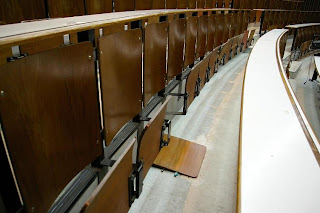Improving learning experience in Lecture Theatres
Presentation Slides:
Reflections:
For this assignment, we understood "Lecture Theaters" as a technological element of the larger teaching/learning system.
A "lecture" is essentially a form of passive learning (single directional information flow from the speaker to audience), therefore we felt that it is very important for the other non-teaching related elements to support the delivery of the content, which makes up the overall system of teaching and learning.
In other words, a lecture can happen anywhere, you can have a group of students sitting down on the school lawn surrounding the teacher in the middle, and it's still a lecture session, but the learning experience will definitely be different.
Hence the Lecture Theater itself is, in a sense, a tool, whose function is to help a better delivery of lecture content to the larger audience.
Generally for the system to work well, all the elements must work together according to their functions, therefore for our investigation, we are assuming that the Lecturer and the Lecture Content are both good, and thus not a contributing factor for learning experience. We instead investigate other elements which influence the delivery/ receiving of lecture content, such as:
- Audio & Visual
- Chairs
- Temperature
- Lighting
- Other students
The framework we used to analyze Lecture Theaters as technology map the various elements to the four Emotional Threads: Compositional, Emotional, Spatio-Temporal, Sensual
We then formulate our research to find out what really determines the enjoyment of learning in lecture theatres.
Our initial assumption is that both Compositional and Sensual emotional threads increase enjoyment in attending lectures. To explore this, we employed two methodologies, Laddering and Survey.
Reflections from Laddering
Although we specifically wanted to find out about the Lecture Theaters, we purposely framed the question to be a general view about learning experience in NUS Lecture Theaters.
From a random sample of students whom we managed to interview, we found that neither of them talked specifically about the Lecture Theater, but rather talked about things like how they enjoyed going to lectures with their friends or how comfortable the lecture sessions are for playing games.
We found that to “ladder” them to find the root cause of the phenomenon do not land us in the kind of answer that we are looking for, therefore we decided Laddering may not be the appropriate methodology for such an investigation.
Reflections from Survey
We decided that a more favorable way to derive any useful insights from the students is through survey, which we did through an online site, and we managed to get 25 valuable responses from a random sample of NUS students.
Our focus of the survey is to find out what makes up a good lecture theater, so the very first set of questions straight away asked them:
- What is your most favorite Lecture Theaters (LT) and why?
- What is your lest favorite LT and why?
What we found is a striking candidate for most favorite and least favorite LT.
LT 11 seems to be the winner while LT 26 seems to be the most problematic. From their responses as for why they chose these LTs, both LTs seem to be completely opposite of each other in terms of Chair& Table comfort level, Room design & feel, room odor and room brightness level. LT 11 also seemed to be appraised for its new & spacious design and the number of power points for laptops.
LTs like LT26 hardly appeals anyone. Crammed seats, uncomfortable chairs, sometimes broken ones, funny room odor, very old look& feel, I wonder how students so far have put up with it...
New Contemporary design and spacious seating. Comfortable chair& fold-able writing arm. LTs like LT11 are hit amongst our generation of students.
Our other set of questions probed the four Emotional Threads:
We asked them about how the chairs, the tables, the projector screen size and the sound system are, and we found most of them do not have problems with these compositional elements. However those who voted for LT26 being the worst LT all stated that the chairs and tables were poor and uncomfortable.
We asked them about the preferred seating position, such as which row/ section do they tend to sit, and their preferred lecture time. Most seem to like the Middle Front row/ Center combination and lectures are preferably in the morning.
We asked them about their opinion regarding the temperature, the brightness and noise level in LT. Most seem to think that the temperature is a bit too cold and room brightness tends to be dark.
We asked what they think the importance of LT as tool for learning is, and interestingly, most seem to feel that the LT itself is not the most important aspect of the learning experience.
We also asked the following questions to sort of get an idea of the effectiveness of learning experience in LT:
- Do you ask questions? – Most answered No or sometimes
- Do you sleep? – Most answered Rarely
- Do you talk? – Most answered between Sometimes and often
- How often do you arrive late for lecture? – Most answered Sometimes
- Do you sms during lectures? - Most answered between Sometimes and often
- Do you use laptop? – Most answered Never or Rarely
Conclusion
Although 25 respondents is hardly enough to derive something that we could generalize, we do manage to find some useful insights regarding which LT is favorable and not, and what makes them so. It seems that the Chairs design is the most determining factor, while other factors such as overall interior design and feel of the LT seem to influence the respondents' opinions. Other environmental factors such as room temperature and air odor also is worth taking a note at.


